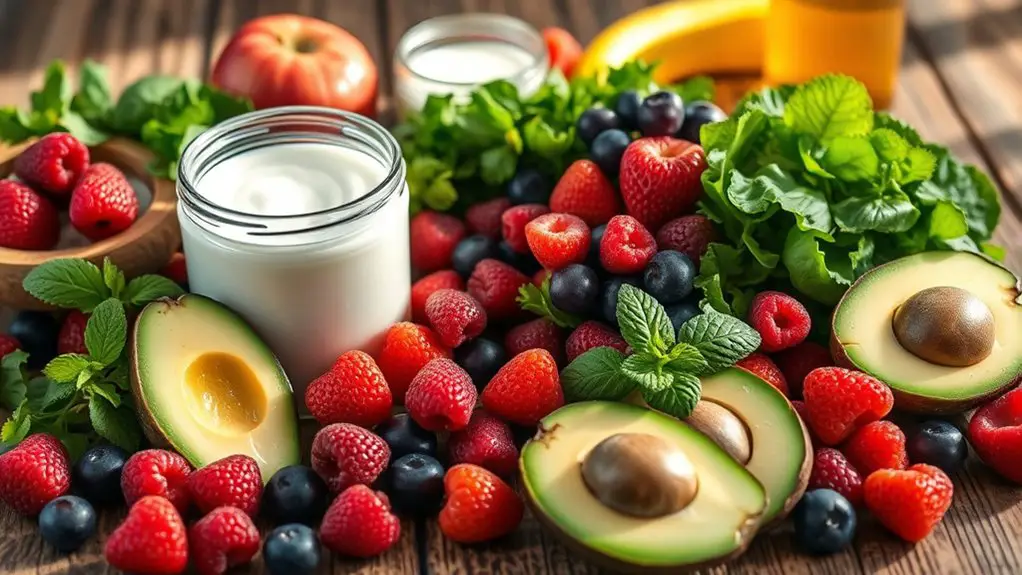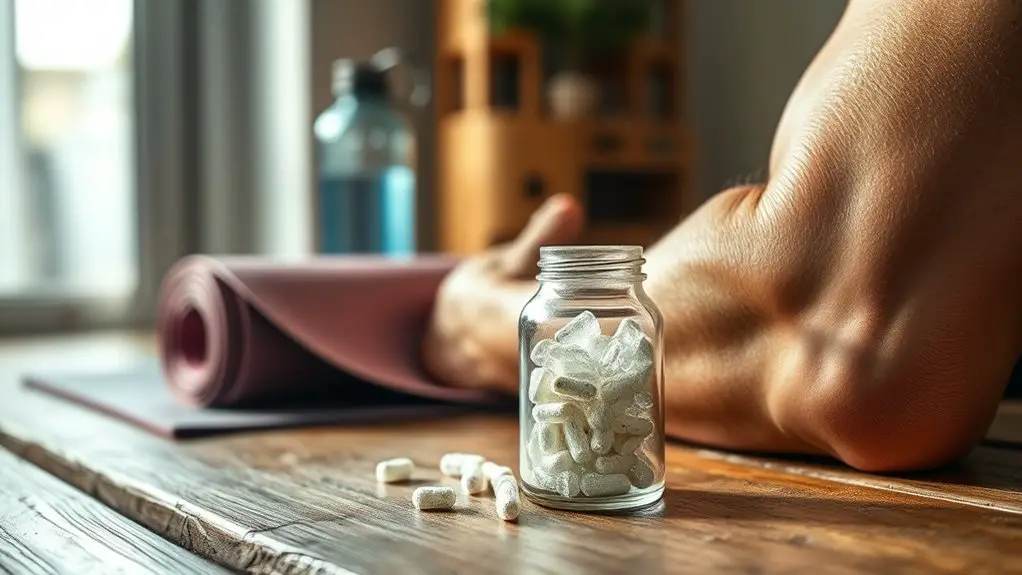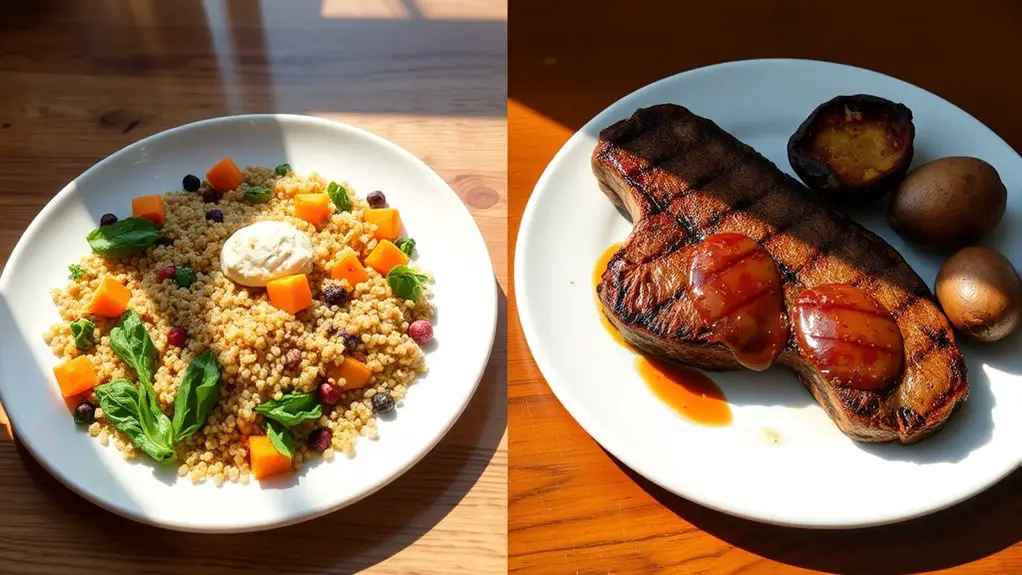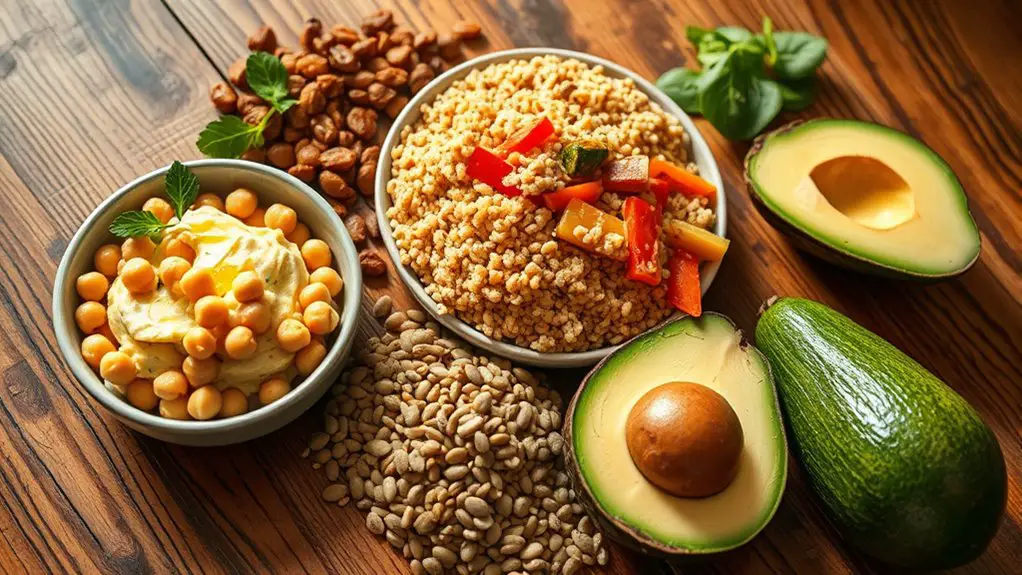To improve your gut health for better athletic performance, focus on a balanced diet rich in fiber, omega-3 fatty acids, and antioxidants. Incorporate probiotics from fermented foods like yogurt and prebiotics from bananas and onions to support a healthy microbiome. Stay hydrated and manage stress through techniques like meditation and regular exercise. With these strategies, you'll enhance nutrient absorption and reduce inflammation. There's more to uncover about customizing your gut health plan for ideal results.
Understanding the Gut-Athlete Connection
While you might think of training and nutrition as the primary drivers of athletic performance, the health of your gut plays an essential role that shouldn't be overlooked. Your gut isn't just a digestive system; it's a powerhouse influencing your energy levels, recovery, and even mood. When your gut microbiome is balanced, you'll absorb nutrients more efficiently, enhancing your physical capabilities. Conversely, an unhealthy gut can lead to inflammation, fatigue, and decreased performance. By understanding this gut-athlete connection, you can make choices that support not just your physical training but your overall well-being. Embracing this knowledge gives you the freedom to release your potential, ensuring that every workout counts, and every meal fuels your journey to greatness.
Key Nutrients for Optimal Gut Health
To support ideal gut health, you'll want to focus on key nutrients that help maintain a balanced microbiome. Fiber is essential; it fuels beneficial bacteria and promotes regular digestion. Incorporating a variety of fruits, vegetables, and whole grains guarantees you're getting enough. Omega-3 fatty acids, found in fish and flaxseeds, reduce inflammation and support gut lining integrity. Don't forget about antioxidants from colorful foods, like berries and leafy greens, which protect gut cells from damage. Fermented foods, while not part of the next topic, are also beneficial for nutrient absorption. Finally, hydration is key—water helps transport nutrients and supports overall gut function. Prioritizing these nutrients empowers you to enhance your gut health and, ultimately, your athletic performance.
The Role of Probiotics and Prebiotics
Understanding the role of probiotics and prebiotics is essential for optimizing your gut health and, by extension, your athletic performance. Probiotics are live bacteria that promote a balanced gut microbiome, which can enhance digestion and boost your immune system. By including fermented foods like yogurt, kefir, and sauerkraut in your diet, you can support this beneficial bacteria.
On the flip side, prebiotics are non-digestible fibers that feed those good bacteria. Foods like bananas, onions, and garlic are great sources. Together, they create a thriving environment for your gut, improving nutrient absorption and reducing inflammation. By prioritizing probiotics and prebiotics, you can unleash your body's potential, leading to greater freedom in your athletic pursuits and overall well-being.
Hydration and Its Impact on Digestion
Proper hydration is essential for maintaining effective digestion, especially for athletes pushing their limits. When you're well-hydrated, your body can break down food more efficiently, allowing nutrients to be absorbed and used for that extra mile or intense workout. Dehydration can lead to sluggish digestion, bloating, and discomfort, which can hinder your performance. Aim to drink water consistently throughout the day, not just during workouts. Incorporating hydrating foods like fruits and vegetables can also help. Remember, it's not just about quenching your thirst; it's about fueling your body for peak function. So, keep that water bottle close and prioritize hydration for a stronger gut and improved athletic performance. You'll feel the difference in your energy and endurance!
Stress Management Techniques for Gut Health
Hydration isn't the only factor influencing gut health; managing stress is equally important, especially for athletes. High stress can disrupt your gut microbiome, leading to digestive issues that hinder performance. Incorporating effective stress management techniques can keep your gut and body in peak condition.
- Mindfulness Meditation: Take a few minutes daily to focus on your breath and center your thoughts.
- Deep Breathing Exercises: Practice slow, controlled breathing to activate your body's relaxation response.
- Regular Physical Activity: Engage in activities you love, whether it's running, biking, or yoga, to boost endorphins and reduce stress.
- Quality Sleep: Prioritize restful sleep to allow your body to recover and maintain gut health.
Embrace these techniques to support your gut and enhance your athletic performance!
Foods to Avoid for a Happy Gut
While it might be tempting to indulge in certain foods after a tough workout, some options can actually compromise your gut health and, in turn, your athletic performance. High-sugar snacks, like candy and pastries, can lead to inflammation and disrupt your gut flora. Processed foods, loaded with unhealthy fats and preservatives, often lack the nutrients your body craves, leaving your gut feeling weighed down. Additionally, dairy products might cause bloating or discomfort for some individuals, so it's best to know your tolerance. Spicy foods can also irritate your digestive system. By steering clear of these gut-busters, you'll set yourself up for better performance and overall health. Your body will thank you for making those mindful choices!
Creating a Personalized Gut Health Plan
To optimize your athletic performance, creating a personalized gut health plan is essential for fueling your body effectively. Start by identifying foods that make you feel energized and those that don't. Tailor your diet to include:
Creating a personalized gut health plan is key to optimizing your athletic performance and fueling your body effectively.
- Probiotic-rich foods like yogurt and kefir for gut balance
- High-fiber fruits and veggies to promote digestion
- Hydration strategies to keep your gut functioning well
- Supplements that align with your individual needs
Track your meals and how they impact your performance to refine your plan. Remember, your gut is unique, so listen to your body and adjust accordingly. By investing time in a personalized gut health strategy, you'll set yourself free to achieve your athletic goals and enjoy the journey.
Frequently Asked Questions
Can Gut Health Affect Recovery Times After Intense Workouts?
Yes, gut health can definitely affect recovery times after intense workouts. If your gut's balanced, you'll absorb nutrients better, reduce inflammation, and feel more energized, helping you bounce back quicker and perform at your best.
How Long Does It Take to See Gut Health Improvements?
Imagine your gut transforming into a thriving garden. You'll likely notice improvements within a few weeks, but real changes can take months. Patience and consistency are key on this journey to wellness and freedom.
Are There Specific Gut Health Tests for Athletes?
Yes, there are specific gut health tests for athletes. You can consider microbiome analysis, breath tests for digestion, and stool tests. These help you understand your gut's unique needs and optimize your performance.
Is There a Link Between Gut Microbes and Injury Rates?
Yes, there's a growing body of research suggesting gut microbes may influence injury rates. When your gut health's off-balance, it could affect inflammation and recovery, potentially increasing your risk of injuries during athletic activities.
Can Supplements Replace a Healthy Diet for Gut Health?
About 90% of your serotonin, the happiness hormone, is produced in your gut. While supplements can help, they shouldn't replace a balanced diet. Embracing whole foods gives you more freedom and benefits for gut health.




